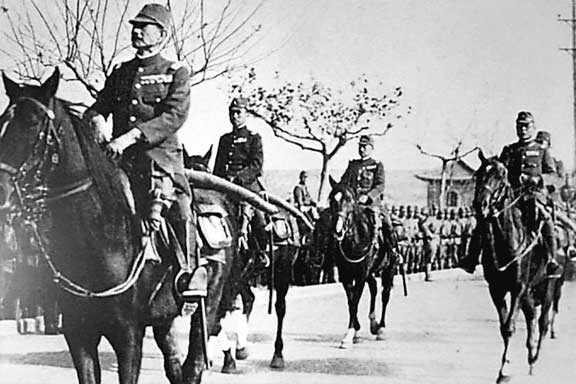FDR and Foreign Affairs

Japanese troops in Manchuria
In Roosevelt's first years in office, foreign affairs were clearly secondary. The rise of Hitler in Germany and Japan's aggressive actions in the Far East were troubling, but they did not deflect Roosevelt from his main domestic issues. The administration took an active part in the London Conference on economic problems but conflicting domestic concerns did not allow the US to be a major influence at the conference. One of Roosevelt's major actions on the foreign policy front during this point, was his recognition of the Soviet Union and the resulting establishment of diplomatic relations.Roosevelt faced the twin threats of the rise of Japanese nationalism and the rise of Nazis in Germany. When Roosevelt took the oath of office, the Japanese had already conquered Manchuria and were driving further into China. He continued the Stimson policy of non-recognition of the Japanese conquest. He considered taking stronger action such as an arms embargo, and even convinced the House to bestow upon him discretionary power to impose the embargo. The Japanese, for the moment, had advanced as far as they wished in China, almost reaching Peking. At this point, they reached a truce with the Chinese, forestalling the need for any immediate action.
Hitler's rise upset the balance of power in Europe. Once again, Europeans became concerned with potential German military power and intentions. A more immediate concern to Roosevelt was the state sponsored anti-semitism that the Nazis instituted. Americans were revolted by what they saw on their newsreels, but under pressure from the State Department, Roosevelt kept silent on the subject.
One of Roosevelt's major action on the foreign policy front was the establishment of diplomatic relations with the Soviet Union. Roosevelt had support from a wide spectrum of Americans who felt that trade was good for the economy. The administration was able to get some verbal concessions from the Soviets on the issue of freedom of religion in the Soviet Union.
Roosevelt's government took part in a conference in London to try to resolve worldwide economic problems. The conflicting policies within the Roosevelt administration on international trade and monetary issues precluded any chance of success from the London meeting. The major issue that the conference tried to deal with was monetary stabilization. When Roosevelt came out against the policy, it doomed the conference.
Reports from the front, however, were far from satisfactory. The Japanese were rapidly advancing across the Pacific. The Japanese rapidly captured Wake Island. They attacked the Philippines, quickly beating American forces. US forces were withdrawn to the Corrigidor Island and from there to Bataan Peninsula where they were forced to withdraw. The only good news on the Pacific front was an attack on Japan by American B-24 bombers launched from carriers.
In the Atlantic the news was no better. German U-boats were sinking American ships in clear view of the coast.
In the meantime, Roosevelt had taken clear control of the war effort. From the moment of the attack, he became the Commander-in-Chief. He was in charge of overall plans and strategy, while leaving to the military the job of implementing them.
 >
>